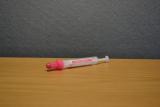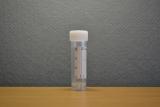Test Directory
Streptococcus pyogenes PCR
Containers - Adult

Red Cap Tube EDTA KE 2.7ml
|
Volume Range
EDTA blood
Additive per Container
EDTA |

20ml Sterile Universal Container
|
Volume Range
Pleural Fluid |
Containers - Child

Red Cap Tube EDTA KE 2.7ml
|
Volume Range
EDTA blood
Additive per Container
EDTA |

20ml Sterile Universal Container
|
Volume Range
Pleural Fluid |
Laboratory Site
Old Dalkeith Road
Edinburgh
EH16 4SA
Transport arrangements
Specimen transport arrangements must be in accordance with current postal and transport regulations. Samples should be transported to the laboratory without delay.
Sample storage arrangements
If processing is delayed, refrigeration at 2-8 C is preferable to storage at room temperature for all samples with the exception of EDTA blood samples.
EDTA blood samples must be stored at room temperature (19-23 C). Patient samples can be transported at ambient temperature.
Special instructions for collection
Sample for Strep. pyogenes PCR should be sent to the laboratory without delay. Clinical samples must be collected into leak-proof containers and placed into a sealed bag with absorbent material.
Patient samples must be individually packaged and not mixed with other patient samples. Any appropriate hazard labelling should be clearly visible on the sample bag/ sample.
How to request
For NHS Lothian users, this test is not requestable in TRAK/ ICE as it is limited to samples already being sent for culture or meningitis PCR.
For non-NHS Lothian users ensure test is ordered via NPex and includes Patient Identifier Number (CHI), Forename, Surname, Date of Birth, Gender and Location of patient.
Availability
Weekdays: 08.30 - 17.00 Sample to arrive by 09.00 for same day processing. Weekends under review.
Anticipated turnaround
2 days.
What happens if the result is positive or abnormal
The Duty Microbiologist will contact the clinical team or referring laboratory to discuss the result and any infection control related issues where appropriate.
Static information/disclaimer
False negative results may occur for a variety of reasons including: inappropriate timing of sample collection, inappropriate sample type, inappropriate sample storage and the presence of pathogen below the detectable limit of the assay.
New and emerging variants may also occur which may not be detected by specific assays.
Towards the limit of detection of an assay sampling variation will result in lower reproducibility. Haemolysed or lipaemic samples can also cause interference with assay results.